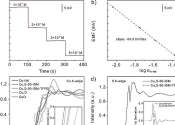Discovery advances ferroelectrics in quest for lower power transistors
(Phys.org)—An article released today by the journal Nature Materials describes the first direct observation of a long-hypothesized but elusive phenomenon called "negative capacitance." The work describes a unique reaction ...









